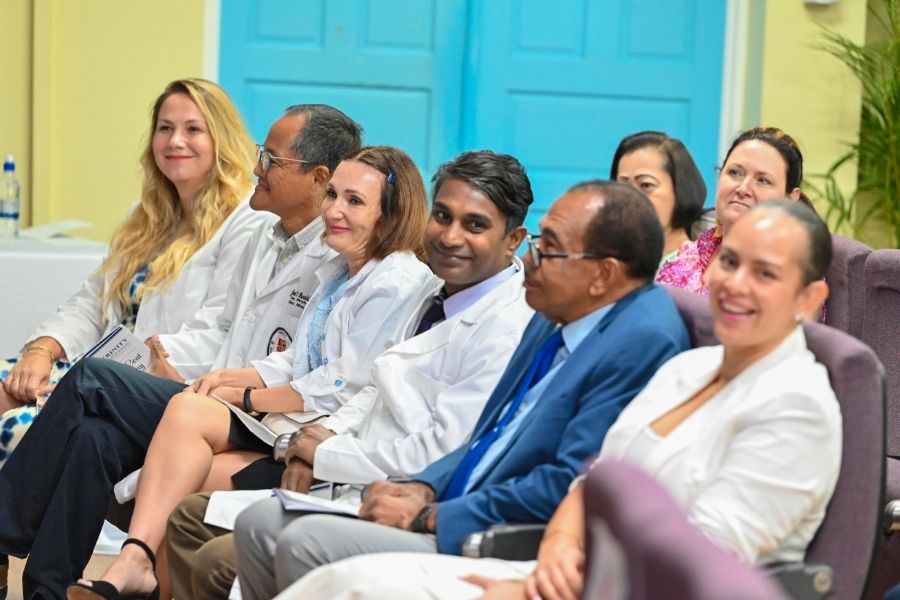The Trinity Difference: How Support Shapes Every Step of the Medical School Journey

Embarking on the path to becoming a physician is a monumental decision—one filled with challenges, hard work, and transformation. At Trinity School of Medicine, students don’t walk that path alone. They are guided, encouraged, and uplifted by a robust network of support that starts before they ever step foot on campus and continues long after graduation. Here’s how Trinity stands out in creating a nurturing, empowering environment for future physicians.

1. Admissions Counselors: Personalized Guidance from Day One
The journey begins with the admissions team, who do much more than evaluate applications. Trinity’s admissions counselors are mentors from the start, offering personal meetings, answering questions about life in medical school, and ensuring applicants feel confident and informed about their decision. Their goal is to help each candidate find the right fit, and if Trinity is that fit, to help them arrive prepared and excited.
“As soon as I applied, the next day, I got an academic advisor and they sent a personalized email saying stuff about the Gators cause I went to the University of Florida. I've never gotten a personal email from a med school. I was always just a number in any other school. So Trinity was the only Caribbean medical school that I applied to, and I was kind of sold from that point on.” - Devin Dolnik, Trinity medical student and SGA President

2. Faculty: Mentors, Educators, and Advocates
Trinity’s faculty members are deeply invested in student success. With small class sizes and a culture of accessibility, students have direct, meaningful relationships with their professors. Whether it's through one-on-one tutoring, research opportunities, or career advice, Trinity’s faculty go beyond the curriculum to help students grow into compassionate, knowledgeable physicians.
“Trinity's faculty is actually really approachable. I feel comfortable going and asking questions, getting advice, and getting help on applications.” - Ella Speck, Trinity medical student

3. The Welcome Committee: Building a Community from the Start
Starting medical school in a new place can be overwhelming, but Trinity’s Welcome Committee ensures every new student feels at home. Comprised of current students, the committee helps with everything from airport pickups to campus tours and local advice. This peer-to-peer support helps new students settle in quickly and creates instant community bonds.
“I got to the island late at night, so seeing familiar faces at the airport was very helpful.” - Dr. Asia McIntosh, Trinity graduate, Medical Director of Palliative Care, and Associate Hospice Medical Director

4. Student Peer Network: Learning and Growing Together
Medical school is a marathon, and peer support is critical. Trinity fosters a collaborative student culture where upperclassmen mentor newcomers, study groups flourish, and wellness is prioritized. Through student organizations, academic societies, and campus events, students build friendships and support systems that sustain them through the rigorous demands of med school.
“You're kind of living on campus amongst all your peers, and you have small class sizes, so you really get to know one another, and it's just that family feeling.” - Dr. Kade Yaschuk, Trinity graduate and Anesthesiology resident

5. Alumni Network: Guiding the Next Generation
Trinity’s global alumni network serves as an invaluable resource for students and graduates alike. Alumni regularly return for panel discussions, mentorship programs, networking events, and to commencement to hood their mentees. They offer real-world insights into residency, licensure, and life after Trinity, providing students with a clear picture of what’s ahead—and how to get there.
“My best friend, Steven, he graduated last year, and he helped me with a lot of stuff. He’s the reason I figured out I was meant to do Emergency Medicine.” - Dr. Haley Pollock, Trinity graduate and Emergency Medicine resident

6. The Deans: Champions for Student Success
Trinity’s leadership takes an active role in student development. The Office of the Dean is not just administrative—it’s a hub for academic and personal support. Whether helping navigate challenges, celebrating achievements, offering career guidance, or giving personal life advice, the deans serve as steady advocates for every student, fostering an environment of trust and transparency.
“The deans, Dr. Geisler and Dr. Manahan, are second to none…I could tell from the first day that these people get the position we’re in, they are really here for us, and our success is their utmost priority. You can’t question that at all.” - Tyler Collard, Trinity medical student

7. Preceptors: Real-World Experience and Mentorship
During clinical rotations, students work closely with preceptors—experienced physicians who mentor students in real-world medical settings. These mentors are critical to developing hands-on clinical skills, and many form lasting bonds with students, offering letters of recommendation and professional connections that propel students toward residency success.
“My preceptors have been amazing. Last Thanksgiving, I was in general surgery, and my preceptor invited me to his house to celebrate. Another preceptor, an anesthesiologist, invites us medical students to a potluck at his house every month. It’s been great—it really feels like one big family.” - Dr. Faluk Khan, Trinity graduate and Internal Medicine resident
At Trinity, Support Is a Culture, Not a Perk
Medical school is demanding, but it doesn’t have to be isolating. At Trinity School of Medicine, support is woven into every layer of the experience. From the first phone call with admissions to graduation, students are surrounded by people who believe in them, challenge them, and help them thrive.
That’s the Trinity difference—and it’s how great doctors begin their journey.





